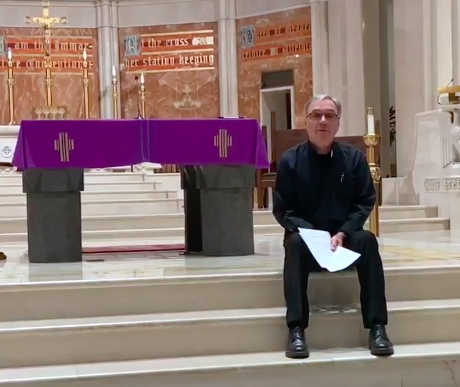Msgr. Neal Quartier, rector of the Cathedral of the Immaculate Conception and a psychotherapist, offers suggestions to address fear, uncertainty, and grief during global pandemic. (Screenshot from a March 19 video message at facebook.com/cathedralsyracuse)
By Renée K. Gadoua | Contributing writer
The last three weeks have spurred a whirlwind of dramatic changes as the United States responds to the coronavirus pandemic. And that’s stressing out a lot of people.
More than one-third of Americans (36%) say the coronavirus is having a serious impact on their mental health, according to a recent poll by the American Psychiatric Association. In addition, 57% of adults are concerned that the coronavirus will have a serious negative impact on their finances; almost half are worried about running out of food, medicine, and/or supplies; and 68% fear that the coronavirus will have a long-lasting impact on the economy.
“This whole changing of our lifestyle causes a lot of grief,” said Msgr. Neal Quartier, rector of Syracuse’s Cathedral of the Immaculate Conception and a psychotherapist who directs the diocese’s Personal Resource Center. “There’s an awful lot going on and a lot of uncertainty. There’s a lot of fear and anxiety.”
In recognition of the mental health impact, Gov. Andrew Cuomo, on March 25 announced a free mental health hotline, staffed by more than 6,000 volunteers. “Don’t underestimate the emotional trauma that people are feeling, and the emotional health issues,” Cuomo said last week.
Msgr. Quartier encouraged people to call the statewide hotline (1-844-863-9314) for support. People with existing behavioral health conditions should stay in touch with their doctors and take advantage of telehealth appointments, he added.
People in 12 step programs should stay in touch with their sponsors, and anyone experiencing suicidal thoughts should call 911, behavioral health experts said.
‘Feelings are normal’
Msgr. Quartier said people will experience strong feelings amid the pandemic. “Feelings are normal,” he said. “We have to watch those feelings, so they don’t go into deep depression. The challenge is to acknowledge them.”
He encourages people to stay connected with friends and family through phone calls, FaceTime, or other technology. “We need that connection,” he said. “We need to be able to say to someone, ‘I’m scared. I’m anxious. I’m worried about my health, I’m worried about my job, about paying my bills.’”
The physical distancing required to prevent spread of the coronavirus, which causes the respiratory disease COVID-19, leads to social isolation. That, in turn, can lead to loneliness, fear, and low self-esteem. It may blood pressure and weight, and may lead to increased drug and alcohol use, according to experts.
“People who are predisposed to anxiety are really struggling right now,” said Jodi Kapes, director of behavioral health at Mohawk Valley Health System.
Uncertainty can be especially challenging for “people with major mental illness who have a baseline that is paranoid and not trusting of the media,” Kapes added.
Beware of ruminating thoughts, difficulty sleeping or eating, or an impending sense of doom that something bad will happen to you or a loved one, she said.
“Sometimes focusing on those things can lead to a panic attack and increased anxiety,” Kapes said.
Slow stress
Instead, do things that help slow stress.
“Focus on the things you can control,” she suggested. “Focus on your language. Say what you’re grateful for. Find ways to have fun at home. Getting exercise and light is beneficial.”
Msgr. Quartier recommends staying in the present: “We can take care of the issues of today,” he explained. “We plan for the future, but do it in the present moment.”
He also suggests centering prayer and mindfulness meditation. “The research on meditation is powerful in how it changes our brain and helps us cope,” he said.
He recommends learning from renowned meditation researcher John Kabet-Zinn. A talk with meditation related to the current crisis is on YouTube. He also suggests apps like Insight Timer.
“Meditating is extremely helpful,” Msgr. Quartier said. “People shouldn’t say they can’t meditate. It’s not about freeing yourself of thought. It’s about awareness. It changes the parts of our brain that allow us to be calm.”
Reciting the rosary or the Stations of the Cross, repeating scripture phrases are forms of meditation. “Meditation goes back to the early days,” Msgr. Quartier said. “Jesus went into the desert to pray.”
Being out of work can lower self-esteem and purpose, so “It’s important to stay active and keep a schedule,” he said. “Not having a structure and schedule can be so detrimental. Get up, read, meditate, pray, cook, go for walk.”
Msgr. Quartier also suggests people keep a journal, watch funny movies, read, practice tai chi or yoga, take on online course, listen to TED talks, or work on home projects.
Although grief accompanies the loss of spiritual community, Easter celebrations, and Eucharist, the faithful “are connected and the Lord will be present in their lives,” Msgr. Quartier said. “Even as we come together virtually, we know we’re all in this together. We are all in this as the Communion of Saints.”
Msgr. Quartier and Kapes agree on one way to reduce stress: Limit media consumption.
“Listen to the doctors and the experts. They’ll tell us when it’s OK to get back to normal,” Msgr. Quartier said. “Don’t watch the news 24/7. That is not uplifting at all.”
Renée K. Gadoua is a freelance writer and editor. Follow her on Twitter @ReneeKGadoua.
How to get help
• New York State Office of Mental Health Emotional Support Line: 1-844-863-9314
• People with a medical or behavioral health emergency should call their doctor or 911 immediately
• National Suicide Prevention Lifeline: 800-273-8255
• National Suicide Prevention chat service
• New York is seeking qualified health professionals to help
• Stress and coping strategies from the Centers for Disease Control and Prevention






